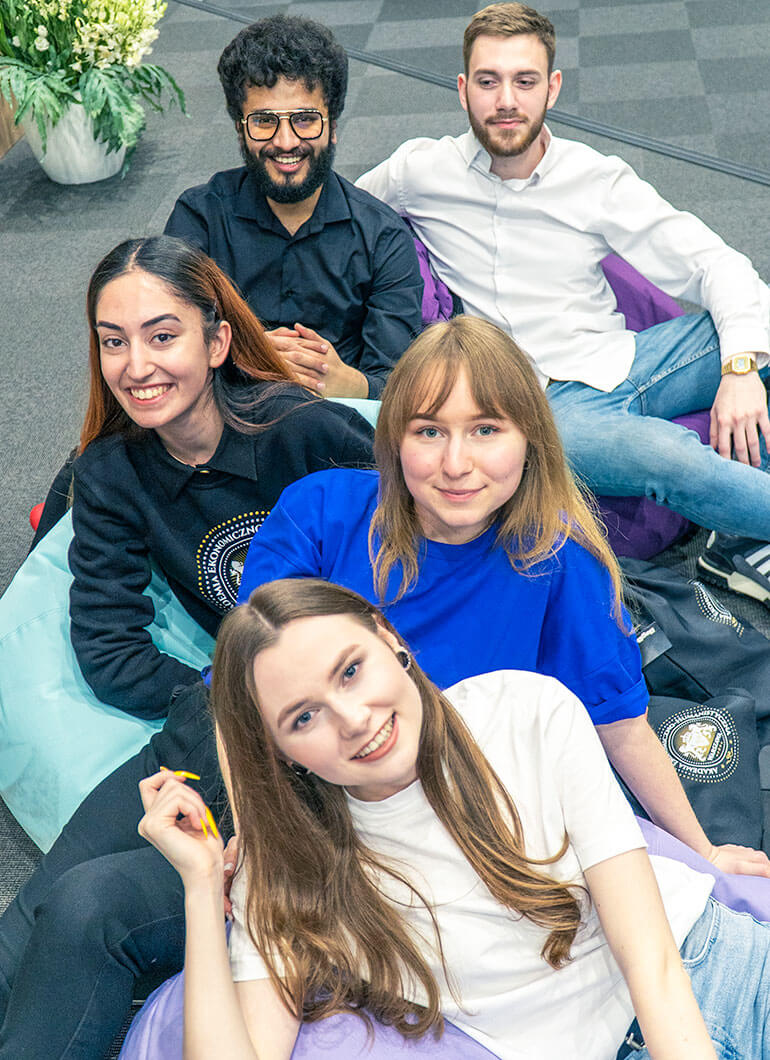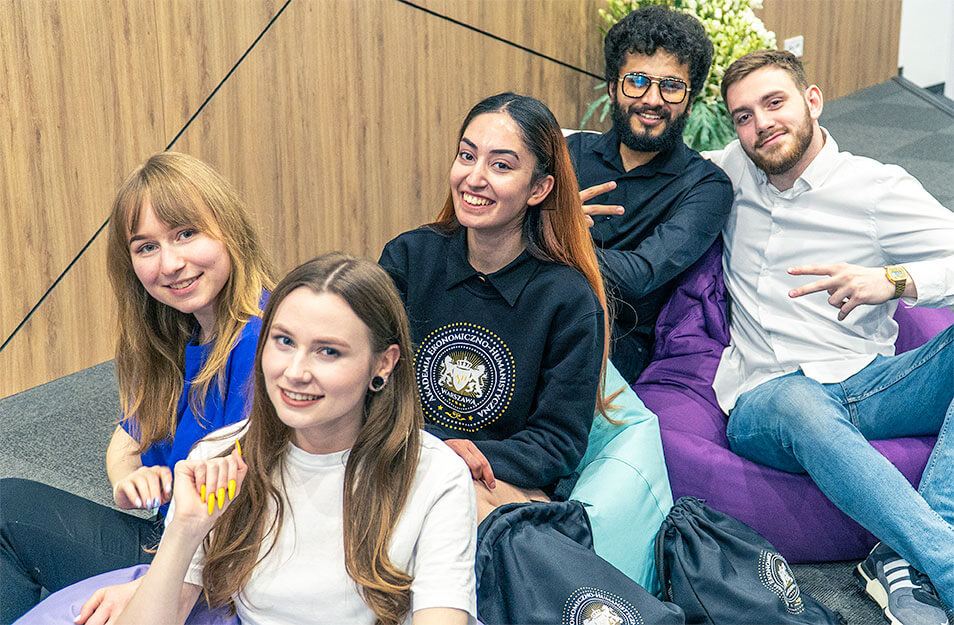Dietetics
Undergraduate (Bachelor)
Dietetics
Why is it worth choosing these studies?
In the modern world, people pay more and more attention to a healthy lifestyle, and hence to healthy and conscious nutrition. The correct choice of diet is a factor that affects almost every aspect of human life. Regardless of whether our goal is to lose weight, gain muscle mass, maintain a healthy and youthful appearance,
support the body in the fight against infections, or support the proper development of children, a dietitian is often the first specialist we may ask for help. Dietetics studies offer students the opportunity to acquire theoretical and practical knowledge that will allow them to work in the broad scope of dietetic.
What can you do after graduation?

Completion of the course provides broad employment opportunities, including health care facilities, outpatient treatment, dietary offices of specialist clinics, social services institutions, resorts, educational institutions, mass catering facilities, departments of food hygiene, food industry plants, factories producing catering equipment, sports centers, food inspection institutions, and sports activity and fitness centers.
Partners

This program
is for you if:



New requirements for visa applications
Note: important information for bachelor’s degree candidates (first-cycle studies)
In line with the new requirements for visa applications introduced by Polish consulates around the world, candidates applying for a student visa are now required to submit a document confirming their eligibility to apply for a bachelor’s degree (first-cycle studies), issued by the Polish Education Superintendent Office (in Polish – Kuratorium Oświaty). Previously, this document could be provided after arrival in Poland, but under the new regulations, it must be submitted along with the visa application. The procedure for master’s degree candidates remains unchanged.
While the new requirement may slightly extend the visa process, the VIZJA University is fully prepared to support bachelor’s degree candidates throughout this period. To ensure there are no disruptions to their education, candidates who cannot arrive in Poland before the start of classes will be able to participate in lectures online via MS Teams.
We also have developed a range of effective solutions to provide comprehensive assistance in obtaining the required documents. Our support includes:
- preparing the necessary paperwork
- certified translations into Polish
- submitting the application to the Education Superintendent Office
- promptly ensuring the recognized diploma is sent back to the candidate’s home country.
Would you like more information and support? READ MORE
Program and structure of studies
FIRST CYCLE STUDIES
(BACHELOR'S DEGREE)
The study program covers issues related to the understanding and practical use of knowledge in the field of dietetics in various spheres of professional activity.
Online studies for the Dietetics course
In the Dietetics course, a small number of hours of classes during the whole study must take place at the university, because of the necessity for students to get practical laboratory skills. The schedule will be planned in such a way that these classes will be held once for the whole 3-year course of studies, in a block lasting about one week. The dates of this block of classes will be planned and announced well in advance of each year of study, so that the student will be able to choose a convenient time to take part in such classes.
FIRST
YEAR OF STUDY
The first year of studies is dominated by subjects in the field of basic medicine and clinical sciences, providing students with knowledge and basic skills necessary for specialists dealing with broadly understood health issues – including dietitians. They are the foundation for a scientific understanding of the functioning and biology of the human body. As part of the program, the first year will also include a number of classes devoted to basic issues in the field of dietetics as a medical science.
| Subject name | Cummulative amount of ECTS points | Cummulative amount of hours (FT/PT) |
| OHS | 0 | 8/8 |
| Academic Skills | 1 | 15/8 |
| Biochemistry | 4 | 30/16 |
| Genetics | 4 | 30/16 |
| Basics of Human Nutrition | 5 | 54/32 |
| Public Health and Epidemiology | 3 | 30/24 |
| Introduction to Psychology / Fundamentals of Social Communication (Elective) | 5 | 30/24 |
| Polish Regional Cuisine / World Cuisine (Elective) | 3 | 25/16 |
| Subject name | Cummulative amount of ECTS points | Cummulative amount of hours (FT/PT) |
| Foreign Language (Elective) | 2 | 30/16 |
| Sports and Recreation Activities (I) | 0 | 30/0 |
| Human Anatomy | 5 | 54/32 |
| Human Physiology and Pathophysiology | 5 | 54/32 |
| First Aid | 1 | 15/8 |
| Basics of Dietetics | 5 | 54/32 |
| Basics of General Food Technology | 3 | 30/16 |
| General and Food Chemistry | 5 | 60/32 |
| Methods of Nutritional Status Assessment | 4 | 30/16 |
SECOND YEAR OF STUDY
During the second year of studies, the program includes subjects focusing on specialist knowledge necessary for the work of a dietitian. In accordance with the assumptions of the dietetics program, the student chooses numerous subjects that will allow her/him to concentrate on the issues that are at the center of her/his interests. Starting from the fourth semester, the student begins internships (in non-clinical institutions) and begins to prepare her/his own social project, which in the field of dietetics replaces the obligation to prepare a written diploma thesis.
| Subject name | Cummulative amount of ECTS points | Cummulative amount of hours (FT/PT) |
| Foreign language (Elective) | 2 | 30/16 |
| Sports and recreational activities (II) | 0 | 30/0 |
| Clinical outline of diseases | 4 | 30/16 |
| Parasitology / Allergology / Microbiology (Elective 2/3) | 4 | 30/16 |
| Food hygiene and safety | 4 | 30/16 |
| Adult nutrition | 4 | 54/32 |
| Sports nutrition | 4 | 60/40 |
| Food toxicology | 3 | 39/24 |
| Diet characteristics and dietary supplements / Functional food (Elective) | 4 | 60/32 |
| Subject name | Cummulative amount of ECTS points | Cummulative amount of hours (FT/PT) |
| Foreign language (Elective) | 2 | 30/16 |
| Pharmacology | 3 | 30/16 |
| Laboratory diagnostics | 2 | 30/16 |
| Nutrition of pregnant and lactating women | 4 | 54/32 |
| Nutrition of children | 4 | 54/32 |
| Nutrition in disease states - nutrition plans | 4 | 45/32 |
| Health psychology | 2 | 30/16 |
| Professional practice I (non-clinical) (Elective) | 15 | 375/375 |
THIRD YEAR OF STUDY
In the third year of studies, in addition to subsequent major classes, there are also courses aimed at providing practical knowledge about the essence of working in the profession of a dietitian and running your own business. In the fifth semester, the student completes the next part of the internship (in clinical institutions).
| Subject name | Cummulative amount of ECTS points | Cummulative amount of hours (FT/PT) |
| Foreign language (Elective) | 3 | 30/16 |
| Psychopathology / Psychosomatics (Elective) | 3 | 30/16 |
| Nutrigenomics | 2 | 30/16 |
| Food commodities with elements of technology / Food preparation technology (Elective) | 3 | 54/32 |
| Dietary counseling / Principles of menu design and diet planning (Elective) | 3 | 45/32 |
| Project preparation methodology | 2 | 30/16 |
| Professional practice II (clinical) (Elective) | 15 | 375/375 |
| Subject name | Cummulative amount of ECTS points | Cummulative amount of hours (FT/PT) |
| Dietetics in practice | 2 | 30/16 |
| Dietitian's workshop: modern technological solutions and career prospects | 4 | 60/32 |
| Dietitian technology / New generation food / Nutritional value of food (Elective 2/3) | 4 | 54/32 |
| Dietitics - revision book | 4 | 54/32 |
| Entrepreneurship / Project management (Elective) | 3 | 30/16 |
| Bioethics and professional ethics of a dietitian | 3 | 30/16 |
| Social project | 1 | 15/8 |
The content of the study program may change as a result of efforts to improve the quality of education and adapt the teaching offer to the current challenges of the labor market. Each change is approved by the University Senate and introduced with the aim of preparing students for their future careers in the best possible way.
Tuition fees
Fixed tuition - flexible payments
By choosing to study at VIZJA University, you can be sure that the tuition fee will not change throughout the duration of your studies. You can pay the tuition fee once for the entire year of study or spread over a semester payment. This allows you to decide how you want to plan your expenses.

Fees (academic year 2025/2026)
| Year of study | Annually | Per semester* |
| I | 2700 € | 1500 € |
| II | 2700 € | 1500 € |
| III | 2700 € | 1500 € |
*Semester payment is possible from the second year of studies.
| Year of study | Annually | Per semester* |
| I | 3700 € | 2000 € |
| II | 3700 € | 2000 € |
| III | 3700 € | 2000 € |
*Semester payment is possible from the second year of studies.
EU and other countries group
This group includes citizens of the countries member states of the European Union and the following countries citizens: Azerbaijan, Belarus, Bosnia and Herzegovina, Montenegro, Georgia, Kazakhstan, Kosovo, Kyrgyzstan, Latin America, Macedonia, Moldova, Russia, Serbia, Tajikistan, Turkey, Turkmenistan, Ukraine, Uzbekistan.
Other countries
The citizens of all the remaining countries.
Study in Polish!
Do you want to study at VIZJA University in Polish? It is possible! We have prepared a special program for international students to acquire the skills necessary for active study in Polish and for academic, social and everyday life in Poland.
The Comprehensive Polish Language Program for International Students is:
- part of The VIZJA University Foundation Program, which is a comprehensive preparation for starting regular Bachelor's or Master's studies in Polish at VIZJA University
- a course aimed at two groups of international students: students with knowledge of a Slavic language (Russian, Ukrainian, Czech etc.) and students without prior knowledge of any Slavic language
- a chance for immersion in Polish society and culture, authentic experience of life in Poland and broad career prospects on the Polish labour market
More details coming soon!
Scholarships - easier than you think

While studying at VIZJA University, you can take advantage of a wide range of financial support from the state budget and European funds, as well as benefit from special discounts with VIZJA University discount program
You can submit most scholarship applications quickly and easily through your online account.
In the academic year 2023/2024, VIZJA University awarded 800 Rector’s Scholarships, ranging from PLN 400 /month to PLN 1000 /month, depending on the average or achievements. For outstanding sport, artistic or scientific achievements, the Scholarship Committee awarded scholarships of PLN 600 /month.
Detailed information on the possibility of applying for the Rector’s Scholarship is available in the dean’s system.
A sports scholarship may be awarded to a student who excels in sport achievements at least national level. In addition we also encourage our students to take part in additional support programs- eg. the National Academic Representation.
Young sportsmen can count on financial support in the amount of PLN 600 /month.
Detailed information on the possibility of applying for sports scholarship is available in the dean’s system.
A scholarship for people with disabilities may be awarded to a student who has a disability certificate, a disability degree certificate, a ZUS certifying physician’s certificate, a disability group certificate or a certificate of permanent or long-term incapacity to work on a farm.
In the 2023/2024 academic year, depending on the degree of disability, 350 scholarships for people with disabilities were awarded, ranging from PLN 1700 /month to PLN 1900 /month.
Detailed information on the possibility of applying for a scholarship for people with disabilities is available in the dean’s system.
The allowance is a form of emergency financial assistance. Any student who found himself temporarily in a difficult life situation resulting from random events beyond the student’s control can apply for it.The allowance may be granted twice in one academic year, and the allowance is not granted twice for the same random event.
In 2024, we granted 51 allowances for a total of PLN 255 000. The allowances, depending on the student’s situation, were paid in the amount of PLN 2,000 to PLN 5,000 at a time.
Detailed information on the possibility of applying for the allowance is available in the dean’s system.
2023/2024 academic year
800 Rector’s Scholarships
51 allowances
350 scholarships for people with disabilities
12 500 000 PLN was spent in 2023/2024 on scholarships
PLN 1,890,289.35 was spent in 2019/2020 on scholarships
PLN 2,911,662.50 was spent in 2020/2021 on scholarships
PLN 4,158,177.00 was spent in 2021/2022 on scholarships
PLN 7,829,950.00 was spent in 2022/2023 on scholarships
Rector’s Scholarship – highest average: 5,44





